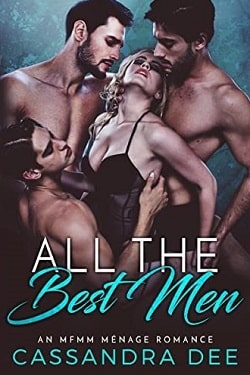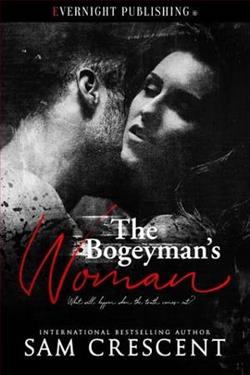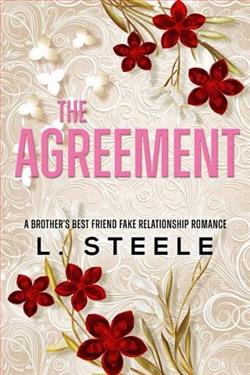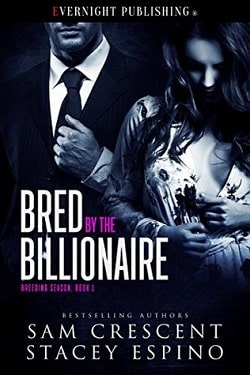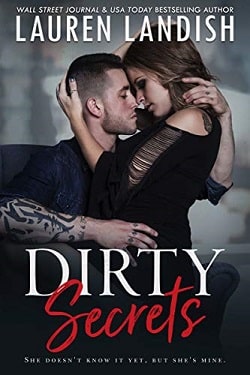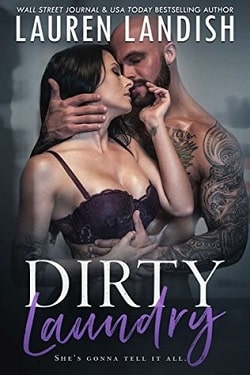Page 3 of Nocturne
I’ve always been told as a redhead that I should avoid the color, that the combination is too garish, that I would look like a blood stain.
The thing is, I like looking like a blood stain. I like that when the men in the crowd watch me with those cruel and hungry eyes, that I come across as a warning. Of course, they don’t realize it. It’s all in the subconscious, that deep, hidden part of us that Freud liked to go on about. More often than not, that layer is where I have the most power. I think a lot of women carry their power there, whether they know it or not.
“Five minutes, Miss Reid,” Anne says, poking her head in the dressing room.
I eye her in the mirror and smile at the sight of her cherubic brown face. I quickly raise a finger. “Hold on,” I tell her, getting out of my chair. “I missed you the other night.”
I reach into my vanity case and pull out a paper bag, wincing at the grease spot in the corner, then stride across the room in my stockinged feet, and hand it out to her. “Sorry, one of thesandwiches is probably a little stale, but I made the other one just before I came here.”
She gives me a shy look, hesitating before she accepts them. I’ve only been singing at The Emerald Room for two years, but Anne seems to have come with the institution. I also know she has two small children to support and barely makes enough money to survive, her husband having died during the war. I try to kick back what money I can to her, at least when Marco isn’t looking, but I can always bring her extra food. The woman is too skinny and I know whatever food she has is always going to her kids. Sometimes I wish I could sit her down and make her eat it in front of me.
Then again, maybe she doesn’t actually like my sandwiches.
“You shouldn’t have,” she says as she always does, eyes downcast, clutching the bag to her chest.
“It’s my pleasure,” I tell her. “You know I love to cook.”
Which is a lie I tell her. Aside from the sandwiches, which I only bring for Anne since my ideal food is a little more complex than that, I’ve never cooked anything. I worried about that when I first met Marco, thinking he might expect me to become a housewife and make him dinner every night. Thankfully, he only seems interested in me as arm candy and a good roll in the hay.
For now, anyway.
Anne gives me a grateful nod. “You best get ready. It’s a crowded house tonight.”
She hurries off down the hall and I quickly walk back to the mirror, leaning beneath the lights and studying my face. I give one more swipe of my lipstick, blot with powdered paper, then pull my hair over my shoulder. I slip my heels on and smooth down my dress, which looks dull here but will sparkle like dewdrops on roses once I’m out in the spotlight.
I step out into the hall, taking my place in the wings of the stage, hidden from the spectators. The sound of the last notesfrom the band, combined with the clink of glasses and the sprinkle of merriment from the crowd, wash over me and I close my eyes for a moment, breathing in deeply through my nose. I always get the jitters at this point, always takes me a moment to come into my own.
The crowd is yours, I repeat to myself.You’re in your element. You’re doing what you’re meant to do until you get where you’re meant to be.
When I open my eyes, I’m ready to go. I look to Joey, the stage manager, waiting for my cue to go on stage. He doesn’t give me a nod yet, just holds my gaze before looking out at the crowd. His expression is tense, brow lowered, jaw tight, and I immediately feel a creeping sensation on my scalp.
Something is wrong.
I raise my brows, trying to silently ask him what it is. He just shakes his head slightly, rubbing his lips together as he scans the room. Finally he gives me terse look and nods, followed by a faint thumbs up.
Sometimes bad things happen when I’m at work. I’m no stranger to violence. It pulses in the veins of this city. And when you’re a singer at The Emerald Room—which belongs to the most notorious gangster in Los Angeles—sometimes there’s bloodshed.
But when I step onto the stage, everything seems as it should be. The crowd looks to be a mix of the regulars—dealers, mobsters, criminals, women out for a good time with the wrong men, and the occasional skittish couple dressed to the nines, wondering if they’ve made a mistake.
Just before my introduction is made and the spotlight comes on my face, I catch a glimpse of three cops standing at the side of the stage. They look like the regulars who always come in here, ready to look the other way when they get their bribes. But still, the way they stand there, hands clasped at their fronts, watchingme patiently, I can’t help but feel a thread of panic. My instincts are better than most human’s and I’ve learned to trust them.
Then the spotlight blinds me and I fall into routine. I delicately grab the microphone, giving a sly smile to the crowd, something that’s both seductive and secretive, and with the band’s cue, I launch into my first song, “I Cover the Waterfront.” Somehow I’m able to keep my worries out of mind, my role coming as easy to me as slipping into a warm bath.
I do my usual set of five songs, finishing to applause and the occasional rose hurled on stage. It isn’t until I’m collecting them, waving goodbye to the audience, that the prickle on the back of my neck returns. I glance over to the cops, but they’re gone now.
It isn’t until I step backstage that I find out where they went.
All three of them are standing with Joey outside my dressing room.
I catch Anne walking past, giving me a fearful look before she disappears.
“Lena,” Joey says to me as I approach, his tone sobering.
“What’s this?” I ask, my resolve wavering for a moment, trying to appear strong in front of the police. My mind goes over a million things I’ve done wrong, a million reasons why they would come looking for me.
They can’t know. Theycan’t.
“Ms. Reid,” a cop with a red nose says. “Where were you on the night of January ninth?”








